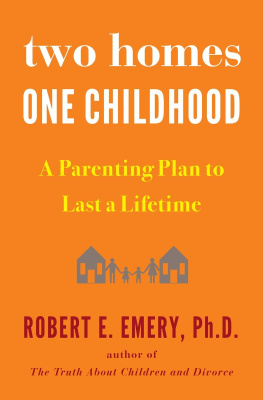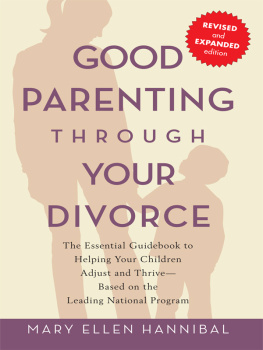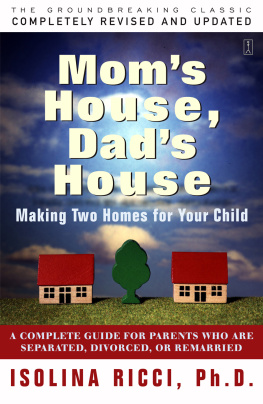Copyright 2016 by Robert E. Emery, PhD
Penguin supports copyright. Copyright fuels creativity, encourages diverse voices, promotes free speech, and creates a vibrant culture. Thank you for buying an authorized edition of this book and for complying with copyright laws by not reproducing, scanning, or distributing any part of it in any form without permission. You are supporting writers and allowing Penguin to continue to publish books for every reader.
Most Avery books are available at special quantity discounts for bulk purchase for sales promotions, premiums, fund-raising, and educational needs. Special books or book excerpts also can be created to fit specific needs. For details, write SpecialMarkets@penguinrandomhouse.com.
Nothing in this book is intended as an express or implied warranty of the suitability or fitness of any product, service, or design. The reader wishing to use a product, service, or design discussed in this book should first consult a specialist or professional to ensure suitability and fitness for the readers particular lifestyle and environmental needs.
All names and identifying characteristics have been changed to protect the privacy of the individuals involved.
All of the cases described in this book are composites. Essential details have been changed to protect the confidentiality and privacy of my clients and research participants. The cases in this book are real emotionally, but no case corresponds to any actual person, living or dead.
PREFACE
Two Homes, One Childhood
I f you have picked up this book, you or someone close to you must be raising a child in two homes. You may be in the middle of a divorce. Or maybe you already have been divorced, perhaps long ago. Maybe you never were married, but you live apart from the father or mother of your children, someone you may have lived with for quite some timeor not. Maybe you were in a same-sex relationship, and share a child you and your partner planned and birthed together, or perhaps adopted. (All of these experiences are divorce in my book, and in this book, so keep reading no matter how your child ended up with two homes.) Or you may have a friend, or perhaps a child, who is going through divorce. You are looking for a way to help him or her. If so, this book is for you too.
Whatever your situation, lets be clear about one thing from the very beginning:
Divorce stinks.
Divorce stinks if you got dumped by someone you thought you could trust forever. Divorce stinks even if, deep down, you think you may actually be better off living apart. Divorce stinks if you initiated the breakup and thought this was what you wanted, or needed, or had to do. Divorce stinks even if your decision to live separately was mutual, and you both are doing your best to do things right. Divorce stinks even if its your friends, or your relatives, who are splitting up, not you.
Most of all, divorce stinks for children.
Whether you are eager to move on or so emotionally devastated that you think you never can, my goal is to help you make living in two homes less of a burden for your children. I dont want your children, or anyones children, to be children of divorce or children from broken homes. I hate those labels. Children do not have to be defined by their parents romantic relationship. Children shouldnt be defined by divorce (in its many forms). And you can make sure that doesnt happen. You can make sure that your children get to be just kids. That is my goal for you and for them.
Children have only one childhood. Childhood can be, should be, a time of innocence, trust, wonder, joy, exploration, learning, making strong, worthy effortsand making lots of mistakes too. Childhood is a time when forgiveness, fresh starts, and repeated mistakes all should be expected and accepted. Childhood is a time when nothing, even the sternest reprimand, should shake a childs sense of being loved, of feeling safe and secure. Childhood is about learning lessons of independence and responsibility, while venturing forth from the safe base of parental love. Childhood means being protected from deep wounds that refuse to heal, but not from lifes bumps and bruises, from pain that teaches essential, if sometimes difficult, lessons.
Your children have two homes but only one childhood.
You, and I, want to protect and preserve your childrens childhood.
You can do this, together with your ex. You can still share in your childrens joys and fret about their frustrations. You can find a way to still be parents, even though you are no longer husband and wife (or whatever). And if you can still be parents, separately and together, your kids can still be kids, despite growing up in two homes.
Of course, being a parent is never easy. Parenting in two homes can be especially hard. To protect your childrens childhood, you are going to need to put in extra effort, emotionally, practically, and financially.
You may think your ex is a narcissistor maybe just a jerk. You may wish he or she were not your childrens father or mother. If so, I understand that feeling. But you need to understand that your children probably do not feel the same way. And if they do, that may be a problem. Children shouldnt have to choose sides, picking one parent over the other. Even if your ex is a jerk, he is still your childrens father. That isnt going to change. So you and your children are going to need to find some way to deal with him.
Right now, you may feel so devastated that you think you just cannot go on. You cant do this all on your own. You may be beyond exhausted, beyond depressed. You may have a great deal of emotional work to do. If so, I urge you to get startedfor your childrens sake, and for yourself. I can help you begin.
Or maybe you have a more friendly relationship. If so, good for you, and your ex too. That will make things easier, but not easy.
There are different styles of coparenting relationshipsangry, friendly, and distant. What is distant coparenting? Distant coparenting is when you have little negative connection, or communication, with your ex. But you also have little positive engagement. Some people in distant relationships still feel a lot of tension or anger or pain. They find that keeping their distance is the best way to avoid explosions. For many people who have had an angry divorce, distance is the most, or the only, realistic goal.
If this is you, you can make distance work. You do not need to feel friendly toward your ex. But you do need to find ways to communicate and cooperate with her about the basics of rearing children in two homes. You also need to make sure that your distance is not some form of the silent treatmentfilled with tension and ultimately a contest over your children.
Whatever your coparenting style, I have advice for you. Part of that advice is that being a parent is hard work, no matter what.








